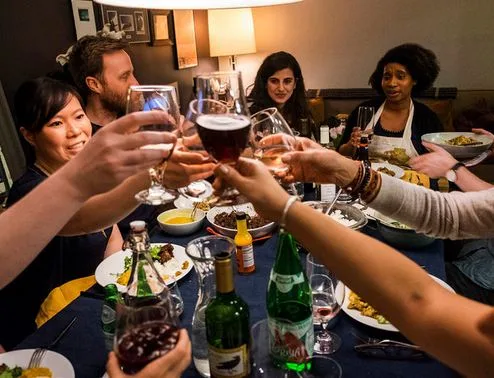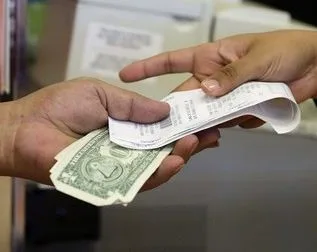In Ecuador, don’t be on time for dinner
By Ed O’Connor
If you receive a dinner invitation do you show up at the appointed hour or a few minutes before? Do that in Ecuador and you may find the hosts still in the shower. To arrive on time is considered rude here, as a matter of fact.
Our first personal ![]() experience with this cultural phenomenon was when we were invited by residents of Cuenca to an 8 p.m. Christmas Eve dinner. We arrived at 7:45 p.m. and were the first guests there.
experience with this cultural phenomenon was when we were invited by residents of Cuenca to an 8 p.m. Christmas Eve dinner. We arrived at 7:45 p.m. and were the first guests there.
Preparation of the dinner had not even been started. We sat looking at each other until other invitees arrived — from 9 p.m. until 10:30 p.m. Dinner was “promptly” served at 11 p.m. Lesson learned.
 Our former pastor from New Mexico invited some Cuencano church members to experience an American-style Thanksgiving Day dinner. Dinner was to be served at 6:30 p.m. They never showed until 8:30 p.m. By that time, we had finished dinner, dessert, washed and dried the dishes and put them away. They couldn’t understand why we had eaten at 6:30.
Our former pastor from New Mexico invited some Cuencano church members to experience an American-style Thanksgiving Day dinner. Dinner was to be served at 6:30 p.m. They never showed until 8:30 p.m. By that time, we had finished dinner, dessert, washed and dried the dishes and put them away. They couldn’t understand why we had eaten at 6:30.
We attend as many performances of the Cuenca Symphony Orchestra as possible, although we missed a few because of the rain. The concerts begin at 8 p.m. The locals are still wandering into the theater as late as 8:45 p.m., and they think that is perfectly acceptable.
Street names get confusing
This was one of the most confusing aspects of learning “the lay of the land” here in Cuenca.
The streets and avenues are named after historical figures or important historical dates. When one takes a taxi, one asks the driver to take them to the street where one wants to go and the nearest cross street. For example: we primarily walk every place, but if it is raining we will try to get a cab. So, we have to ask the driver to take us to Augustin Cueva and Remigio Tamariz, the closest intersection to our apartment. Street names are not posted at the corner of every block. One can walk for blocks before seeing a street sign, which can really be frustrating.
Don’t expect to get proper change
Making a purchase and getting change. Having worked retail for years, we would start the day with a certain amount of money in the cash register so if a customer made a purchase we had enough money to make change. Not here.
 I learned about the change foible when I went to one of the malls and wanted to make a $22 purchase. I gave the store clerk a $20 and a $5. She did not have change and sold me the items for $20.
I learned about the change foible when I went to one of the malls and wanted to make a $22 purchase. I gave the store clerk a $20 and a $5. She did not have change and sold me the items for $20.
Two weeks ago, we went into a store to buy two handmade rugs, the total was $31. We gave the lady $35. We had to wait until another customer made a purchase to get our change. Last week when I bought the boots for $15 the clerk left the store and then come back with the change for the $20 bill I gave her.
It is the customer’s responsibility to have correct change. This does not apply to the very large stores. And don’t carry anything larger than a $20 bill. Most smaller stores will not accept larger denominations.
The liberals cry out
There was a home invasion here in the city and the perpetrator was caught by the neighbors. The police arrived just in time. The neighbors had doused the would-be thief with gasoline and were going to “light him up.” I can hear the ACLU wailing about how his civil rights were violated.
Thoughts about IESS
The price of government health insurance here is increasing dramatically. We were really underpaying and it finally caught up. Now to keep the IESS insurance (government insurance), expats must pay 17.6 percent of their income for a single or 21 percent for a couple. There was a government meeting to present and discuss the new cost to expats, but presenters were shouted down by expats and the meeting was ended. It was the “entitled” ones that disrupted the meeting.
I understand that after the meeting this situation was discussed at many restaurants.
Until later from beautiful Cuenca … Eddy the Expat




















